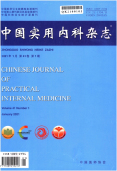中国实用内科杂志2024,Vol.44Issue(5):391-396,6.DOI:10.19538/j.nk2024050108
2型糖尿病患者维生素D与血管紧张素转化酶2及炎症因子的相互作用研究
Effect of vitamin D deficiency on ACE2 and inflammatory factors in patients with type 2 diabetes
摘要
Abstract
Objective To analyze the levels and correlation of vitamin D,ACE2,ACE and inflammatory factors in patients with type 2 diabetes mellitus and explore the interaction of vitamin D with ACE2 and inflammatory factors and the mechanism of action on the occurrence and development of diabetes.Methods A total of 87 non-diabetic controls and 96 patients with type 2 diabetes mellitus were chosen,who visited Hebei People's Hospital and were hospitalized from July 2021 to November 2021,and they were divided into non-diabetic normal vitamin D group(47 cases)and insufficient vitamin D group(40 cases),and diabetic normal vitamin D group(52 cases)and insufficient vitamin D group(44 cases)according to serum 25-hydroxyvitamin D level.Detect inflammatory indicators such as ACE,ACE2,IL-6 and TNF-α in each group,and analyze the correlation and influencing factors between vitamin D and each indicator.Results Compared with the normal vitamin D group,the vitamin D insufficiency group had significantly higher HOMA-IR,Ang Ⅱ,IL-6,and TNF-α levels and significantly lower ACE2 and IL-10 levels in both non-diabetic and diabetic patients(P<0.05).Compared with the non-diabetic vitamin D insufficiency group,with the increase in severity of vitamin D deficiency,blood glucose,ACE and inflammatory factors were significantly increased,insulin resistance was more serious,and ACE2 and IL-10 were significantly decreased(P<0.05).Pearson correlation analysis showed that vitamin D was negatively correlated with Ang Ⅱand IL-6,and positively correlated with IL-10 in the non-diabetic group(P<0.05).In the diabetic group,vitamin D was positively correlated with ACE2 and IL-10,and negatively correlated with ACE,Ang Ⅱ,IL-6,TNF-α,HOMA-IR and HbA1c(all P<0.01).Multiple linear regression analysis showed that IL-10 and Ang Ⅱ were the main influencing factors of vitamin D deficiency in the non-diabetic group(P<0.05),which explained 33.6%of the total variation of the regression equation.In the diabetes group,ACE2,IL-6,TNF-α,IL-10 and HOMA-IR were the main influencing factors of vitamin D deficiency(P<0.05),which explained 55.8%of the total variation of the regression equation.Conclusions Vitamin D deficiency may lead to dysregulation of ACE2,ACE/Ang Ⅱ and increased levels of inflammatory factors.Vitamin D deficiency exacerbates insulin resistance by mediating the RAS system,which is involved in the potential pathogenesis of diabetes.ACE2,ACE/Ang Ⅱ and inflammatory factors can be used as susceptible markers of vitamin D deficiency in diabetes.关键词
维生素D/糖尿病/血管紧张素转换酶2/白细胞介素6/胰岛素抵抗Key words
vitamin D/diabetes/angiotensin converting enzyme 2/interleukin 6/insulin resistance分类
医药卫生引用本文复制引用
邢晨皓,卢亚敏,唐红悦,张翠改,刘光霞,陈芳,侯瞻,吕秀芹..2型糖尿病患者维生素D与血管紧张素转化酶2及炎症因子的相互作用研究[J].中国实用内科杂志,2024,44(5):391-396,6.基金项目
河北省政府资助临床医学优秀人才培养项目(2020124) (2020124)
河北省医学科学研究课题计划(20230388) (20230388)

